Agriculture is one of the very first industries that have adopted automation as a tool for improvement. Automated agriculture is also referred to as smart farming. Implementation of automation in agriculture helps in improving farm efficiency and enhances the livestock production cycle. However, agricultural automation is highly dependent on the mechanical equipment used in the system. The mechanical components like linear actuators play a significant role in agricultural mechanization. In order to perform repetitive tasks, the machinery that are installed feature agricultural linear actuators. These actuators are electrically actuated, therefore they are called electrical linear actuators and they work in coordination with various automation technologies to assure efficiency. This post gives focuses on the role of agricultural actuators in automation.
Role of Electric Linear Actuators in Agricultural Automation
Agricultural actuators play a vital role in mechanization of agricultural processes. Actuators offer motions like push, pull, injection, trigger, etc to the agricultural equipment. Electrical actuators being precise devices offer efficient working. Therefore, from automated tractors to farm maintenance, the agricultural actuators are being utilized. Let us discuss the applications of electrical linear actuators in specific automated agricultural equipment.
- Harvesters:
Harvesting involves reaping and collecting full-grown crops. Earlier this was accomplished using various types of devices such as mowers, balers, choppers, windrowers, and crushers. Nowadays, combined harvesters are used, which comprise reaping parts and balers. These machines also help control weeds. These machines are equipped with electrical linear actuators that drive harvesting blades to operate in a loop motion. This is how the harvesting application becomes quick and effective. The linear actuator offers smooth and continuous functioning to the harvester. Grain tank operation, concave adjustment, etc are the activities in harvester which are actuated by using agricultural linear actuators.
- Mechanized Planting and Harvesting: Planting and harvesting were earlier considered as two labor-intensive tasks. However, today these tasks are automated and accomplished through various devices. The best thing is many of these devices require no human intervention. The following are a few examples of these devices.
- Tractors:
Automated tractors are one of the most popular automation in agriculture. Linear actuators have a massive part in the function of these automated tractors. The command and control features of automated tractors are actuated by using electrical actuators. The activities like, actuating the tractor motion, steering mechanism, tractor ventilation, etc are the activities that are automated using linear actuators.
- Automated Farm Maintenance: The activities like fertilization, grass picking, irrigation, pesticide spraying, etc are nowadays performed using agricultural robots. The following are a few examples of automated farm maintenance equipment equipped with electric linear actuators.
- Irrigation:
Agricultural irrigation is a precision-centered operation. The agricultural linear actuators are used in irrigation systems to trigger water supply in metered quantity. Irrigation techniques like sprinkle irrigation, drip irrigation, centralized pivot irrigation, etc are the techniques that can be accomplished with the help of actuators. Actuator systems are automated by coding for precise quantity, duration, and sensor-based on-off controls.
- Automated Farm Monitoring:
Precision agriculture has emerged as a key requirement in recent years. This is accomplished using specially designed agriculture drones. Over the years, drone technology has evolved, which when combined with image analysis provides important insights to farmers. The drones are mainly used for surveillance activities and they enable farmers to seek information on crops, soil assessment, irrigation and drainage, harvest planning, and so on. Being sensitive to technology, surveillance drones require accurate control. This is achieved by using electrical actuators. Action triggers, return to destination commands, drone tool attachment/detachment, etc are performed by using automated linear actuators.
Learn more on this topic in our related blog: How Actuators are Playing Vital Role in Agriculture?
However, these mentioned benefits of automation in agriculture can only be reaped if quality products are used in automation. Since agricultural mechanization is highly dependent on motion control devices like linear actuator agriculture, it is important to use quality products from trusted suppliers. Venture Mfg. Co. is an ISO 9001:2015 certified supplier of agricultural linear actuators, which have been successfully used to automate various farming equipment. These actuators are provided in custom specifications to meet application requirements.

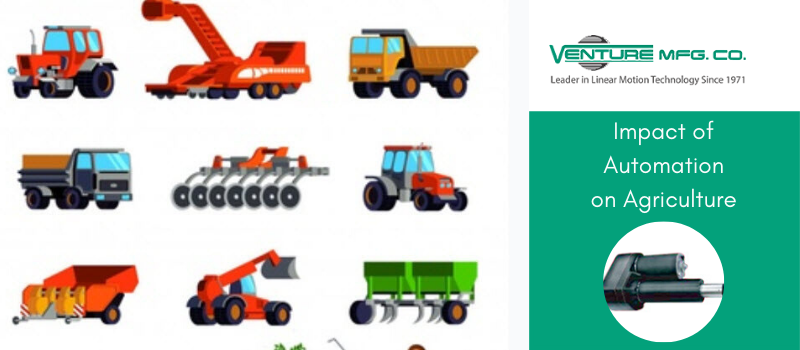
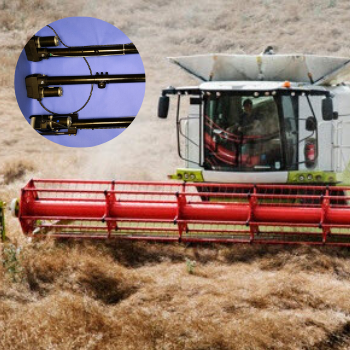 Harvesting involves reaping and collecting full-grown crops. Earlier this was accomplished using various types of devices such as mowers, balers, choppers, windrowers, and crushers. Nowadays, combined harvesters are used, which comprise reaping parts and balers. These machines also help control weeds. These machines are equipped with electrical linear actuators that drive harvesting blades to operate in a loop motion. This is how the harvesting application becomes quick and effective. The linear actuator offers smooth and continuous functioning to the harvester. Grain tank operation, concave adjustment, etc are the activities in harvester which are actuated by using agricultural linear actuators.
Harvesting involves reaping and collecting full-grown crops. Earlier this was accomplished using various types of devices such as mowers, balers, choppers, windrowers, and crushers. Nowadays, combined harvesters are used, which comprise reaping parts and balers. These machines also help control weeds. These machines are equipped with electrical linear actuators that drive harvesting blades to operate in a loop motion. This is how the harvesting application becomes quick and effective. The linear actuator offers smooth and continuous functioning to the harvester. Grain tank operation, concave adjustment, etc are the activities in harvester which are actuated by using agricultural linear actuators.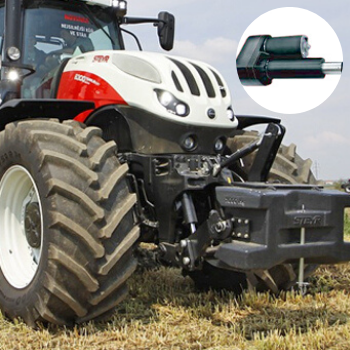 Automated tractors are one of the most popular
Automated tractors are one of the most popular 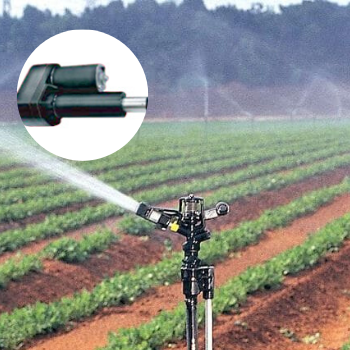 Agricultural irrigation is a precision-centered operation. The agricultural linear actuators are used in irrigation systems to trigger water supply in metered quantity. Irrigation techniques like sprinkle irrigation, drip irrigation, centralized pivot irrigation, etc are the techniques that can be accomplished with the help of actuators. Actuator systems are automated by coding for precise quantity, duration, and sensor-based on-off controls.
Agricultural irrigation is a precision-centered operation. The agricultural linear actuators are used in irrigation systems to trigger water supply in metered quantity. Irrigation techniques like sprinkle irrigation, drip irrigation, centralized pivot irrigation, etc are the techniques that can be accomplished with the help of actuators. Actuator systems are automated by coding for precise quantity, duration, and sensor-based on-off controls.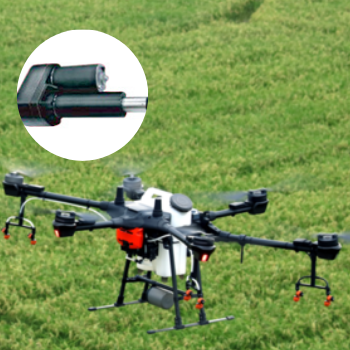 Precision agriculture has emerged as a key requirement in recent years. This is accomplished using specially designed agriculture drones. Over the years, drone technology has evolved, which when combined with image analysis provides important insights to farmers. The drones are mainly used for surveillance activities and they enable farmers to seek information on crops, soil assessment, irrigation and drainage, harvest planning, and so on. Being sensitive to technology, surveillance drones require accurate control. This is achieved by using electrical actuators. Action triggers, return to destination commands, drone tool attachment/detachment, etc are performed by using automated linear actuators.
Precision agriculture has emerged as a key requirement in recent years. This is accomplished using specially designed agriculture drones. Over the years, drone technology has evolved, which when combined with image analysis provides important insights to farmers. The drones are mainly used for surveillance activities and they enable farmers to seek information on crops, soil assessment, irrigation and drainage, harvest planning, and so on. Being sensitive to technology, surveillance drones require accurate control. This is achieved by using electrical actuators. Action triggers, return to destination commands, drone tool attachment/detachment, etc are performed by using automated linear actuators.